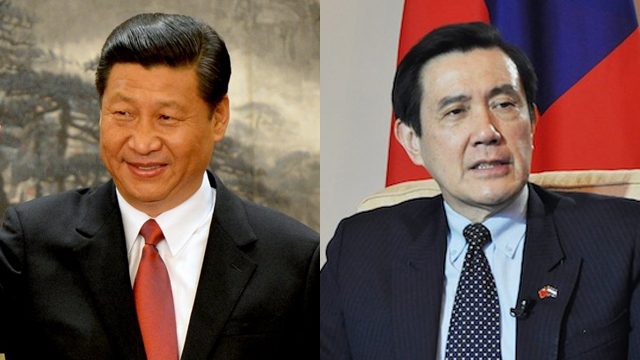SUMMARY
This is AI generated summarization, which may have errors. For context, always refer to the full article.

SINGAPORE – The summit between Chinese President Xi Jinping and Taiwan President Ma Ying-jeou in Singapore on Saturday, November 7, is the first meeting between leaders from the two sides since their 1949 split after a bloody civil war.
Following are key questions surrounding the historic encounter:
Question: Why is the meeting so significant?
Answer: The estrangement that began in 1949 when the Communist army forced China’s Nationalist government to retreat to Taiwan remains one of the world’s last Cold War-era political divides.
The divorce split families, led to decades of tension and periodic fire across the Taiwan Strait, and left a wound in the Chinese psyche that both sides have yearned to heal for decades.
So any progress towards bridging the rift triggers intense emotions while raising the prospect of enduring stability between two dynamic economies – and the Xi-Ma meeting is easily the most significant step forward yet.
Q: Why now?
A: Cross-strait ties have steadily warmed under Ma’s seven-year-old government – which favors moving closer to China – with the summit marking a key milestone.
But China has long spurned top-level contact with what it considers an illegitimate province, and Xi’s motivations for meeting Ma now remain unclear.
Many, however, believe Taiwan’s January elections are a key factor.
Beijing strongly prefers Ma’s Kuomintang (KMT) party over the more independent-minded Democratic Progressive Party (DPP), which remains deeply wary of the mainland Chinese colossus next door.
But the KMT is widely expected to be trounced in January, and the summit has triggered speculation that Beijing is angling to boost the party’s standing ahead of the elections.
Analysts believe China may also be seeking to appear the peacemaker to counter the growing alarm among its neighbors over its rapid military buildup and increasingly uncompromising maritime territorial claims.
Q: What is the agenda and expected outcome?
A: The meeting is deeply sensitive for both sides and thus little has been made known about the expected talking points.
Ma’s camp has said the summit’s goal was to “secure cross-strait peace” but that there would be no agreement signed or joint statement.
China, ever-fearful of appearing to legitimize Taiwan’s government, has said almost nothing about the meeting beyond a confirmation by its state media that it would take place.
Q: What are the potential risks and rewards?
A: Taipei has become increasingly marginalized on the world stage as China’s clout grows, and Ma has voiced hope the meeting could lead to “greater international space” for Taiwan.
Better relations also could help China lure the island into its economic and diplomatic orbit and potentially undercut Taiwan’s US ties, which include an American pledge to assist Taipei in the event of war that China deeply resents.
But the summit is a potential gamble for both Xi and Ma.
It could backfire if already China-wary voters in Taiwan view it as an attempt to influence the vote and award a strong DPP mandate that puts cross-strait rapprochement on hold. (READ: Protests in Taiwan as Ma leaves for meet with Xi) – Rappler.com
Add a comment
How does this make you feel?
There are no comments yet. Add your comment to start the conversation.